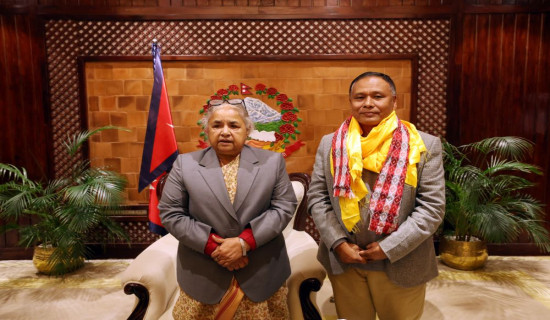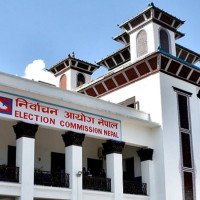- Thursday, 8 January 2026
Nepal makes stance clear on boundary disputes
Kathmandu, Aug. 21: The Foreign Ministry has made its stance on the issue of border dispute in Lipulek and Kalapani clear by issuing a statement on Wednesday evening, after there were news reports that India and China agreed to reopen the Lipulek trade route.
In response to the agreement, the Government has expressed objections to any activities in the area, reminding both countries that the Kalapani region is an integral part of Nepal.
“The Constitution of Nepal has already incorporated Nepal’s official map, which clearly establishes that Limpiyadhura, Lipulekh and Kalapani, located to the east of the Mahakali River, are integral parts of Nepal,” the Ministry of Foreign Affairs (MoFA) said in a statement on Wednesday evening.
Responding to the queries of the media, the MoFA said that Nepal has consistently urged the Government of India not to undertake activities such as road construction/expansion or cross-border trade in that area. “The Government of Nepal has also duly informed our friendly neighbour, China, that the said area falls within Nepali territory,” read the statement.
“In accordance with the spirit and sentiment of the close and friendly relations existing between Nepal and India, the Government of Nepal has remained committed to resolving the boundary problem between the two countries through diplomatic means, on the basis of historical treaties and agreements, facts, maps, and evidence” read the statement, which the ministry said was from Ministry spokesperson.
During the visit of Chinese Foreign Minister Wang Yi to India on August 18 and 19, the two countries reached an agreement to reopen the historic Lipulek Pass. The two countries had agreed to open the Pass for trade during Indian Prime Minister Narendra Modi’s visit to China in 2015, but was shut after their armies clashed in Laddakh in 2020.
Meanwhile, India and China had agreed to reopen the border point for pilgrims visiting the Kailash Mansarovar which happened without Nepal’s notice.
Foreign ministries of India and China in separate statements said that they agreed to open three border passes, including Lipulek Pass, Sipkila Pass in Himanchal and Nathula Pass in Sikkim for trade-related activities.
The Indian Ministry of External Affairs mentioned Lipulek Pass as a part of India’s Himanchal Province.
Earlier, when India and China reached an agreement to open the Lipulek Pass for trade, Nepal had objected to it and sent a diplomatic note.
Earlier, in early 2020, India constructed a road connecting the Lipulek Pass from Dharchula through Kalapani. The Kalapani area, including Limpiyadhura and Lipulek covers about 350 square kilometres.
Located at an altitude of 17,000 feet, Lipulek is a strategic location and the main entry to the sacred Mansarovar. It is near the Tinker Bhanjyang (pass), which is a famous trade route and has high touristic and strategic importance.
According to a report published by The Rising Nepal in May 2020, India had been promoting the view that Lipulek is the trilateral juncture among Nepal, India and China, but historical documents and border experts suggest otherwise. According to them, the trilateral point is Limpiyadhura, not Lipulek.
Although India had been claiming the Nepali territory since the 1950s and there were a couple of bilateral talks on the issue in the past, Nepali government formally asked India to remove the Kalapani area from its map after the latter did so in November 2019.
Following India’s unilateral move to include Kalapani region in its territorial map, Nepal published a new map including it in May 2020. Nepal had sent a diplomatic note to India regarding the Kalapani encroachment, but the southern neighbour has not responded to it.
Meanwhile, the Ministry of External Affairs of India said that border trade between India and China through Lipulek pass had commenced in 1954 and has been going on for decades. In a statement issued on Wednesday evening, it said that Nepal´s territorial claims are neither justified nor based on historical facts and evidence.












-original-thumb.jpg)



